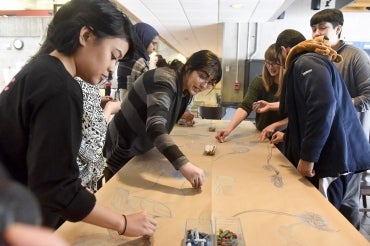Event shines light on Indigenous land where U of T Scarborough now stands

Published: March 15, 2017
A day-long reconciliation event at U of T Scarborough focused on the Williams Treaties, inviting participants to learn about their complicated history and legacy.
“We wanted to raise awareness and pursue change that’s meaningful and lasting,” says Joe Hermer, associate professor of sociology who helped organize the day-long event called Indigenous Stories.
“It’s part of our call to take the Truth & Reconciliation Commission seriously and bring greater attention to these issues.”
The Williams Treaties were two land surrender treaties signed in 1923 that cover substantial tracts across Ontario. One treaty covers lands between Georgian Bay and the Ottawa River, while the other covers lands along the north shore of Lake Ontario – including present-day U of T Scarborough – as well as lands stretching up to Lake Simcoe.
“It’s a complicated treaty, and one that was in many respects mean and petty,” says Jon Johnson, one of the founders of First Story Toronto, a group that tells the story of Toronto’s Indigenous History through walking tours.
The treaties that were signed followed years of investigation by the Williams Commission that discovered Indigenous land claims in these areas were not only valid but covered larger tracts of land than the government previously thought. The Williams Commission figured the value of the land, which covered close to 26,000 square kilometres, was almost incalculable. Despite this, the Williams Treaties single payment to Indigenous people was a paltry $500,000.
Johnson says the treaty was signed during an especially acute time of suffering among Indigenous people in Ontario. He adds it was particularly lopsided because it attempted to extinguish Indigenous relationships to land by removing hunting and fishing rights.
“We think of treaties as being an problem elsewhere in Canada, but here in Toronto the Williams Treaty was complicit in dispossessing Indigenous land, and in many ways helped perpetuate a system of poverty and dependence on government,” he says.
In addition to a talk given by Johnson on the Indigenous history of U of T Scarborough, the event featured a presentation by Reagan Kennedy, the Arts Program Coordinator at Native Child and Family Services Toronto.
An interactive art piece coordinated by Juno Award-winning artist Ange Loft invited participants to map out their existing knowledge along with knowledge gained from Johnson’s presentation.
Visitors were also invited to hear part of Talking Treaties, a project by Jumblies Theatre and First Story Toronto that shares Indigenous stories and knowledge.
“The goal of the project is to raise awareness around the complicated topic of treaties by using symbols, dance, words and pictures,” says Loft, who is the assistant artistic director of the theatre.
In November, the department hosted a screening of The Pass System, an investigative documentary exploring the federal government’s segregation of First Nations people on reserves across Western Canada.
Since the Williams Treaties include land around the Miller Lash House – which was built in 1913 before the Treaties were signed – Hermer says it’s important for these events to remind institutions like U of T Scarborough of the importance of taking a hard look at its own history, especially of ignoring Indigenous issues.
“I encourage everyone to think about how you tell your history,” adds Johnson.
“There are a lot of Indigenous people living in the GTA and many study at the university, so it can help create awareness and build meaningful relationships that work toward something positive.”



